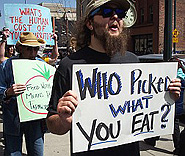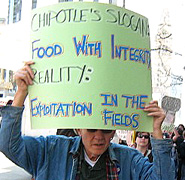 “We decided long ago that we didn’t want Chipotle’s success to be tied to the exploitation of animals, farmers, or the environment.”
“We decided long ago that we didn’t want Chipotle’s success to be tied to the exploitation of animals, farmers, or the environment.”
-Chipotle CEO Steve Ells on sustainable agriculture
What about farmworkers?…
In the press release announcing his company ’s agreement to work with the CIW to improve wages and working conditions in its tomato suppliers’ fields, Burger King CEO John Chidsey said, “The CIW has been at the forefront of efforts to improve farm labor conditions, exposing abuses and driving socially responsible purchasing and work practices in the Florida tomato fields.” Mr. Chidsey went on to say:
“If the Florida tomato industry is to be sustainable long-term, it must become more socially responsible. We, along with other industry leaders, recognize that the Florida tomato harvesters are in need of better wages, working conditions and respect for the hard work they do. And we look forward to working with the CIW in the pursuit of these necessary improvements. We also encourage other purchasers and growers of Florida tomatoes to engage in dialogue with the CIW in support of driving industry-wide socially responsible change.”
With his statement, Mr. Chidsey and Burger King joined Yum Brands and McDonald’s in confirming two propositions that, though seemingly obvious, have been at the heart of the three central, contentious battles of the Campaign for Fair Food:
- The need for labor reform in Florida’s fields is real, and
- The CIW is a proven and effective partner for meaningful farm labor reform.
At the press conference at the US Capitol announcing the agreement with Burger King, Lucas Benitez of the CIW said, “Social responsibility in this country’s food industry is inevitable, and though the exploitation of Florida’s farmworkers remains unconscionable today, company by company we are building a path toward justice. The next steps are up to those companies that stand before us in the road ahead.” He went on to say:
“There are companies — like Chipotle in the restaurant world and Whole Foods in the grocery industry — that already make claims to social responsibility yet, when it comes to tomatoes, fall far short of their lofty claims. It is time, now, that those companies live out the true meaning of their marketers’ words.”
 Food with Integrity?…
Food with Integrity?…
Let’s take the case of Chipotle Mexican Grill. Chiptole aggressively markets itself as a company dedicated to what it calls “Food with Integrity.” The company’s website even goes so far as to claim that Chipotle will “revolutionize the way America grows and gathers its food,” by leveraging its high volume purchases to change its suppliers’ practices.
Given this philosophy, why in the world has Chipotle refused to acknowledge the urgent need for farm labor reform in Florida – in the face of readily available Department of Labor statistics that confirm the severity of farmworker poverty and six federal prosecutions for farm labor slavery in the past decade? And why has Chipotle refused to partner with the CIW?
Well, in the months since the successful conclusion of the Burger King campaign, we’ve had some time to look into the companies that “stand before us in the road ahead,” their practices and their stated philosophies, and in the course of that research we came across the quote by Mr. Steve Ells, the founder and CEO of Chipotle, that begins this update. And that quote – precisely for what it doesn’t say — appears to reveal a crucial blind spot in the company’s vision of “Food with Integrity.”
Here’s the quote again: “We decided long ago that we didn’t want Chipotle’s success to be tied to the exploitation of animals, farmers, or the environment.”
The sentence in and of itself isn’t outrageous — the protection of farm animals, family farmers, and the environment is indisputably a good and important mission. But Chiptole’s total omission of farmworkers — of fair wages and humane treatment for farmworkers in its supply chain — is outrageous. So blind is the company to the need for farm labor reform that, in its list of things exploited in the way our country “grows and gathers its food,” Chipotle excludes the very people who gather our food!
The road to a truly just food industry is long and complex. Chipotle could be forgiven if, in its effort to imagine a world of fair food, it simply overlooked the people who work in the fields.
But as Lucas said in Washington, “After eight years of this campaign — and the very public commitment of the three largest fast-food companies in the world to the principles of Fair Food — they can no longer claim ignorance of the problem nor can they say that the solution is not possible.”
So we ask Chipotle this question: Does it really matter that a tomato is organic if it was harvested by workers paid far less than a living wage, or, worse yet, by people forced to work against their will?
We think the answer is obvious, and we suspect those at the top of Chipotle do, too. So what are we waiting for?…
While we wait for Chipotle, here’s some more reading and resources that might interest you on the question of Chipotle and the Campaign for Fair Food:
- Scholars’ letter – 36 legal, labor, and social science scholars pen open letter to Steve Ells calling on Chipotle to work with the CIW
- Manager’s letter – to deliver to the manager of your local Chipotle restaurant
- Chipotle flyer – coming soon!
And meanwhile, you can check out the action at a recent protest by the Denver-based Fair Food Committee outside Chipotle’s corporate headquarters. Stay tuned for more to come in the growing campaign for real integrity in Chipotle’s tomato supply chain.
